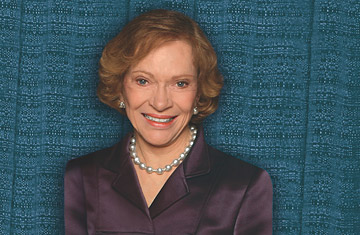
For nearly 40 years, former First Lady Rosalynn Carter has been a passionate advocate for improving the mental-health system, and ending the stigma that keeps many people from getting proper care. In her new book, Within Our Reach: Ending the Mental Health Crisis, Carter writes, "In any given year, approximately one out of every four adults in our country struggles with a mental illness, yet people with these illnesses are a hidden minority who suffer from pervasive discrimination." Carter sat down with TIME senior reporter Andrea Sachs in New York City. The two spoke about giving children psychiatric drugs and the needs of returning vets.
You've been working in the mental health field for more than 35 years. What brought you to this cause.
I've been working 39 years. A long time. 39 years this year. I was campaigning for Jimmy when he was running for governor. The first time, 1966, he lost. The Community Mental Health Center's act had been passed. They were moving people out of the institutions in my state, it was happening all over the country and community health centers had not been built. So I became interested. One day I made a remark that I might work with people with mental illness and somebody in the press heard it and it was in the paper. And the more I thought about it and found out about it, the more I thought it was just a terrible situation with no attention. And I've been working on it ever since.
Here in Manhattan you see many mentally ill people on the street. And the problem seems to be getting worse. Why aren't these people getting any help? Why aren't they in a hospital or facility?
We know what to do for them yet we don't do it. We know how to treat depression, we know how to treat mental illness, and we have not had the political will in our country to make it happen. People are homeless, sleeping on the streets. Yet today, with what we know about the brain, [we can help people] can recover. Even those who are disabled for years can recover with proper help. I'm really frustrated. For me it's a moral issue.
Now that you've mentioned the political, what are the ramifications of the new health care law.
It's very, very helpful. The basic health plan includes mental health and substance abuse services. So that's really good. It makes mental health professionals — and training mental health professionals — a priority. I'm really pleased. It doesn't do everything that I would like it to do but it's a great step forward.
There's been so much controversy about psychiatric drugs for young kids. What do you think about it?
Well there's a debate about that in the mental health field. We really need to do a lot more research because it has not been a very long time since we started giving these drugs to children. Because nobody thought children [could have] mental illnesses. What I do know is that I have seen so many helped to lead good lives that I would not ever do away with drugs to children. But you have to monitor the medication very carefully. And parents have to work closely with the physicians who prescribe them. Children should be taken to a mental health professionals.
What advice would you give to somebody who does have a family member who's mentally ill and doesn't have insurance? Is there any help they can get?
Well for poor people who are underinsured, the new health care bill provides insurance for all of them. But I would advise anybody who can't afford to pay to go to a health clinic. And let the doctor know. The parent might not have money but if they really pull they can get federal assistance, though you know that that's not enough. So it's still a problem.
You write that in the U.S. more lives are lost to suicide than homicide. Is there more that could be done in the field of suicide prevention?
Absolutely. One hundred people commit suicide every day in our country. 10 are children. The mental health system has failed them. Look at depression, which is one of the easiest [mental health] problems to treat. If you look at suicides, most of them are connected to depression. And the mental health system just fails them. It's so sad. We know what to do. We just don't do it. And the stigma contributes to that because people don't go to see a mental health professional because they don't want to be labeled as mentally ill.
What about the vets that are coming home now? Are they getting care?
More attention is being focused on post-traumatic stress disorder (PTSD) and depression. I have some statistics. 14% of those returning [from Iraq or Afghanistan] suffer from PTSD. And 14 more percent suffer from depression. And so it's brought these illnesses to the attention of the public and to the attention of those who are responsible for caring for them. I went to the Democratic Convention. Jeannie Ritter, who's the wife of the governor of Colorado, invited me. I had written her because I heard she was working with mental health patients. In every community in her state with veterans coming back from the war, she has somebody that meets them — often it's a vet that's already come home — to tell them the availability of programs for them, what's available and where to go and get help. And it was really a wonderful program. People are finding ways in the community to help. And I think it's so great.
